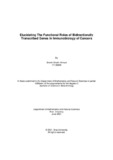Elucidating the functional roles of bidirectionally transcribed genes in immunobiology of cancers

View/Open
Date
2021-06Publisher
Brac UniversityAuthor
Ahmad, Sheikh ShafinMetadata
Show full item recordAbstract
In the realm of correlated regulations in genomic context, bidirectional genes have a
spatial and functional connection unlike any other. These are genes originating on
the same genomic position, but on opposite strands. Usually sharing a common
promoter of hundreds to thousands base pairs, the genes are functionally
synchronized in levels of expression. Within the complex pathogenesis of cancer,
concerted changes like these can lead to tumorigenesis, or result in tumor cell
suppression. In a similar manner, low immune infiltration promotes cancer
progression at earlier stages, but acts as an antagonist during metastasis. In this
study, we have performed functional enrichment analysis of the bidirectional genes
to identify associated cancers. We also looked for the correlation between
bidirectional genes and the immune infiltration profiles of different white blood cells.
Finally, we checked the differential expression of the disease associated genes in
the tumor cells of selected cancer types. Analyzing 5,013 extracted bidirectional
gene pairs, cancers like Colorectal Cancer, Low Grade Glioma, Skin Cutaneous
Melanoma, Liver Hepatocellular Carcinoma, Kidney Renal Clear Cell Carcinoma
could be associated with the deregulation of the pairs. BCL2L12 and IRF3 gene pair
could be positively correlated in the prognosis of LGG with significant patient
survival. Additionally, PSMB9 and TAP1 are highly expressed in SKCM and strongly
correlated with patient survival. These findings can serve as crucial clues to direct
future investigations in cancer immunology and therapeutics.
